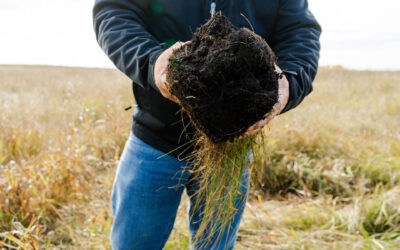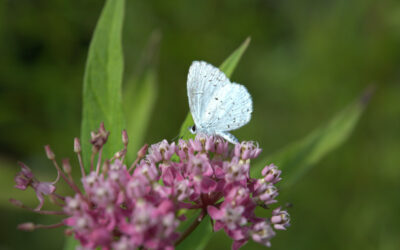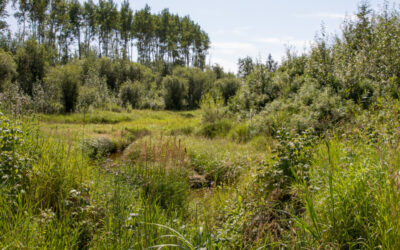Stephen Smith and his wife Helena introduced sustainable farming and enhanced grazing techniques on Speedwell Farms years ago and continue to do so with support from the Grazing Forward program.
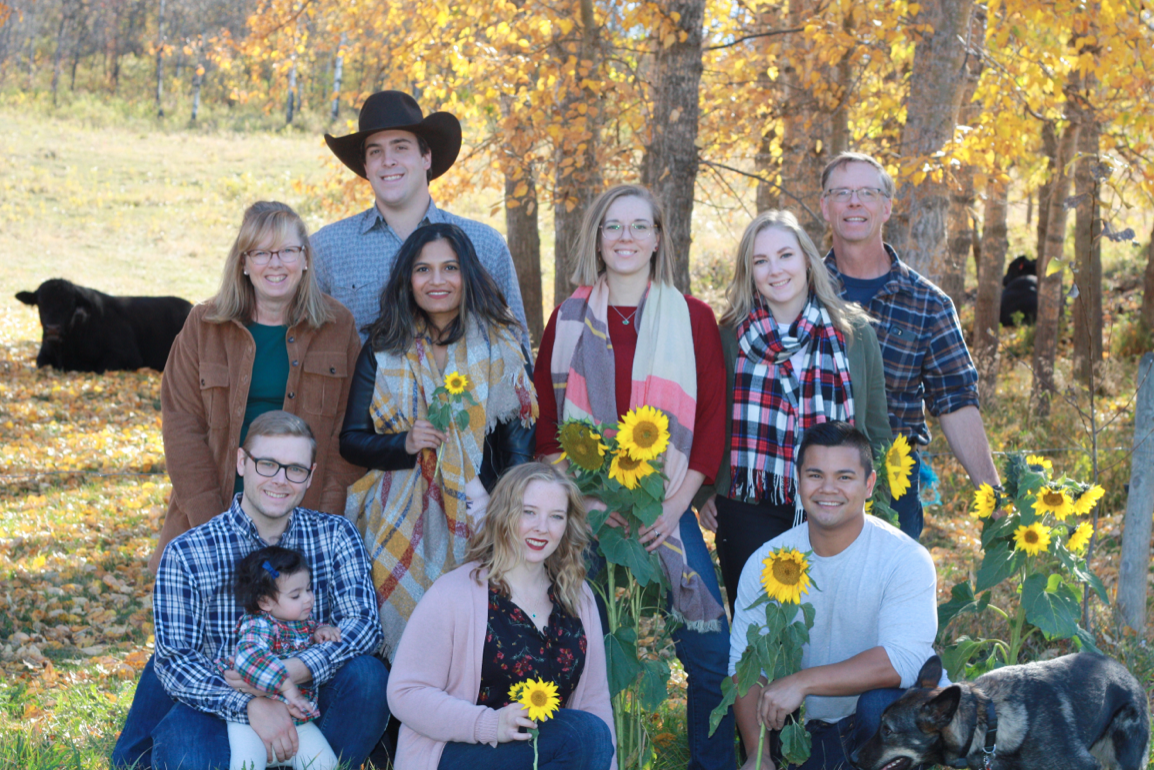
Stephen Smith (top right) and his family.
In 1906, Stephen’s great–grandfather left Denver, Colorado, riding his horse over a thousand miles through the unforgiving terrain of the American Northwest. He knew he had found the perfect place to relocate his family farm when he saw the landscape nestled between the expansive grass plains of the prairie and the aspen outcrops of the foothills. But it wasn’t easy. Stephen’s great–grandparents and grandparents faced major challenges while living and working on the farm. After the war, cancer took the life of his grandfather, but Stephen’s grandmother persevered, raising 5 children on her own.
Despite the hardships, the foothills of Alberta have sustained his family and helped them thrive for over a hundred years.
Stephen and Helena now run Speedwell Farms in the valley of Ghost Pine Creek in Red Deer County, Alberta. Stephen is a third-generation rancher and has been involved with ALUS as a participant, a member of the Partnership Advisory Committee (PAC) and a farmer liaison. His first ALUS project was a restored wetland. Today, he is actively contributing to the Grazing Forward program by practicing adaptative multi-paddock (AMP) grazing.
“A major tornado, three years of drought, a market collapse and the border closed… With the farm on life support, we had to re-evaluate our goals and dreams. We changed our focus to strengthening what we had’”—Stephen Smith
Like their recent ancestors, Stephen’s family also faced challenges that threatened their livelihood. When Stephen took over the farm, he attempted to grow grain, but did not achieve success. Instead, he transitioned to cattle ranching with a small annual crop rotated in. Today, his herd counts approximately 200 head, and the total farm size is 1,700 acres, which includes 500 acres of annual crops.
Stephen and Helena are innovators, exploring wetland conservation since they first began working with Red Deer County’s Off the Creek program in the early 2010s. A few years later, in 2015, the ALUS program launched in the region. With the expertise provided by ALUS, they could identify the marginal areas on Speedwell Farms and initiate their first ALUS project: the creation of a wetland.
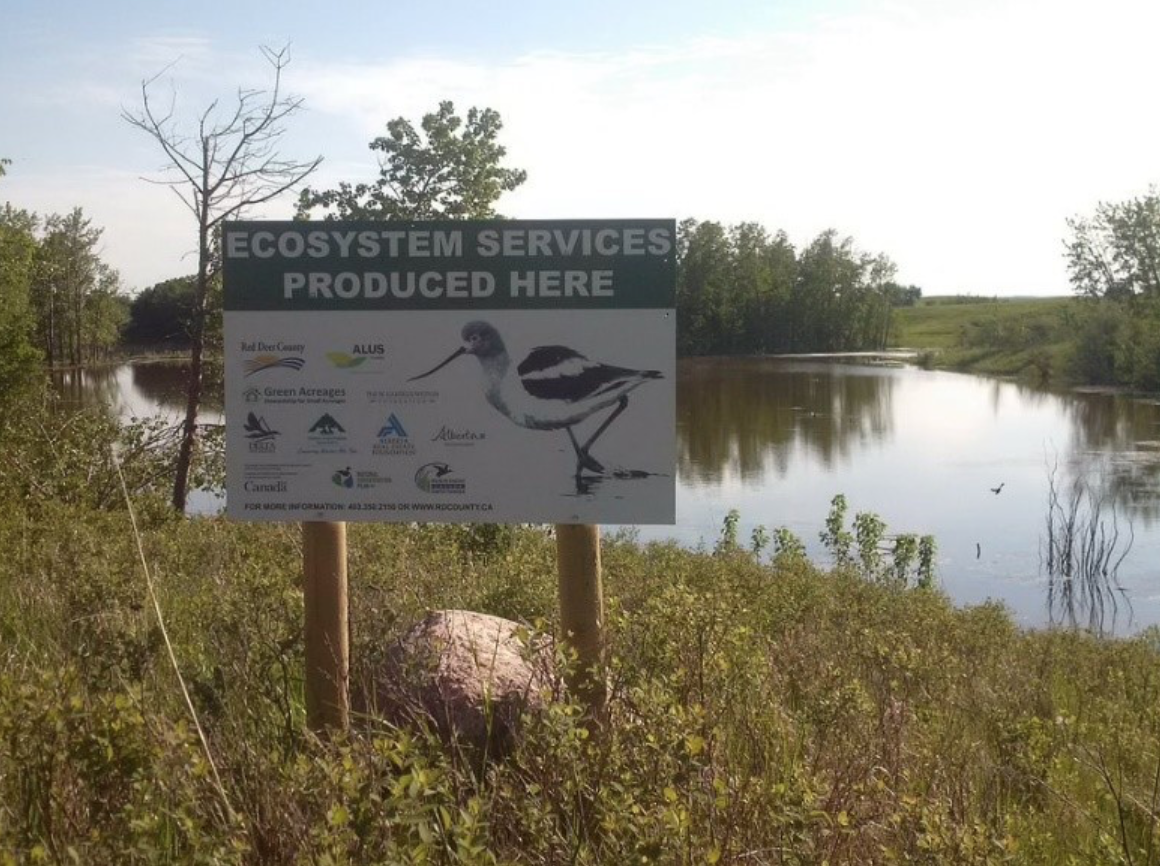
A grazing plan can be simple on flat, even ground. But Stephen’s farm has a unique topography. His grazing project required a complex design of crossed fenced pastures to decrease the time cattle are present on the parcel and increase the rest the parcel gets from grazing. Additionally, this fencing protects woodlands, boggy ground and knolls with high erosion risk. In some cases, tame grass is also separated from native grass.
Using his pressurized alternative watering system, Stephen can now pump water to paddocks beyond the wetland, improving soil health and plant biodiversity across the pastures. Extra fencing can also be added to separate grass species, shorten grazing time, lengthen rest time and increase the volume of litter and grass left for ecological services. With more grass and litter, farmers help preserve biodiversity, filter water and sequester carbon and nutrients in the soil. These interventions were uniquely designed based on Stephen’s relationship with the land and his intergenerational knowledge of the landscape. The adaptive strategy used here both raises overall productivity and maximizes the amount of carbon captured.
“ALUS helped make it possible to execute the first step of protecting the sensitive areas. Now with Grazing Forward, we have the ability to pump water from the lake up 150 feet of a steep hill to the paddocks. This allows further fragmentation of paddocks, keeping nutrients up on the range away from wetlands, therefore producing even more ecosystem services (including carbon capture).” — Stephen Smith
Family is especially important for the Smiths. Stephen fondly recounts spending time with his grandmother in her study as a young boy, usually with a warm cup of tea. He recalls his grandmother stating that in a city, you would often go without, but at the farm, “you will always have food on the table, wood for the fire and a roof over your head.” As an immigrant and single parent, she faced innumerable challenges when supporting her family, but she was forever thankful for the farm.
With these projects completed and the new infrastructure in place, Stephen can focus on the flow of cattle through the system, timing of grazing, weather adjustments and maintenance of the fence and the alternative watering system. In many ways, Stephen has honoured the arduous work of his great-grandparents and grandparents by producing vital ecosystem services for the surrounding communities and ensuring the farm will be able to sustain generations to come.
Learn more about ALUS Red Deer County

